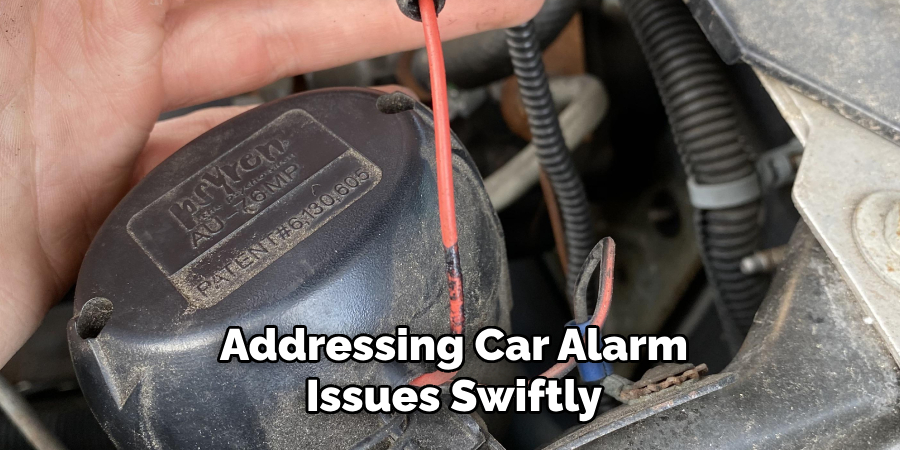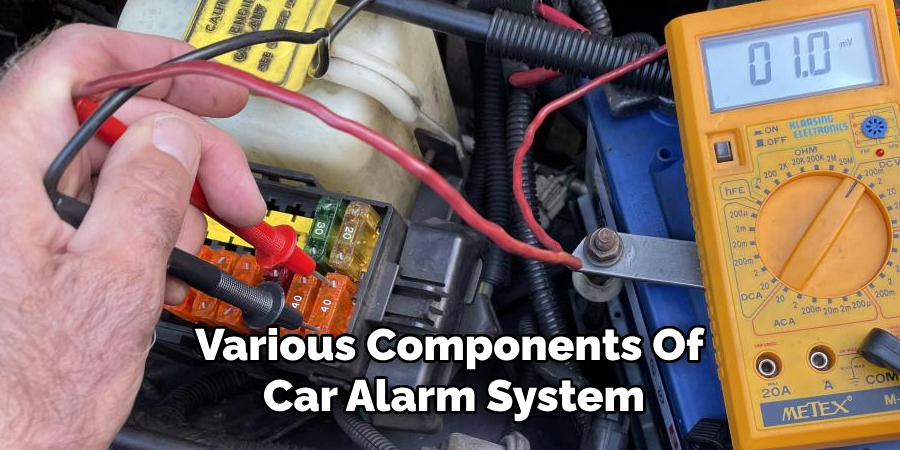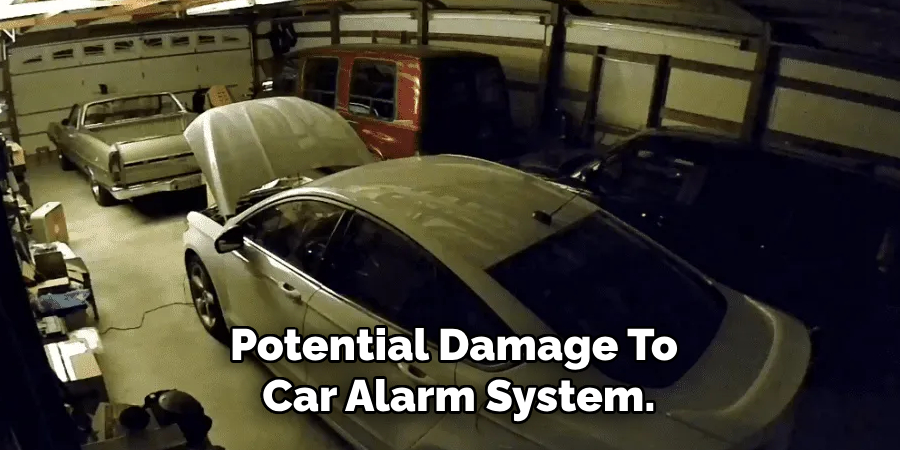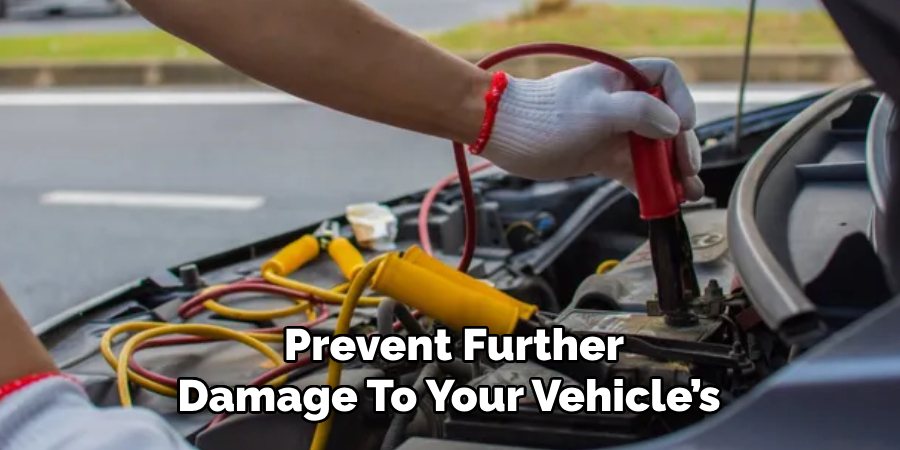Car alarms are essential security systems designed to protect vehicles from theft and unauthorized access, adding a layer of defense to keep your vehicle safe. However, problems can arise when these systems malfunction. One significant issue that car owners often face is how to stop car alarm from draining battery. This problem typically occurs when a car alarm is faulty or continuously going off without valid triggers, leading to unwanted battery drainage.

Consequently, this can result in frustration and the inconvenience of a dead battery. The purpose of this article is to serve as a comprehensive guide to prevent a car alarm from depleting your vehicle’s battery. It includes various troubleshooting techniques, maintenance tips, and practical solutions designed to ensure your car alarm functions efficiently without draining your car’s battery unnecessarily.
Understanding How a Car Alarm Can Drain a Battery
How Car Alarms Draw Power
Car alarms are designed to stay vigilant even when your vehicle is turned off, requiring a constant, albeit small, draw of power from the car’s battery to maintain their sensors and readiness. Typically, a well-functioning car alarm system consumes minimal energy, which doesn’t impact the battery noticeably. However, over time, even this small consumption can contribute to battery depletion if the vehicle is not driven regularly or if the battery is already weak.
Faulty Alarm Systems and Excessive Power Drain
A malfunctioning car alarm can lead to significant battery drain. Common causes include faulty sensors, wiring issues, or alarms that are repeatedly triggered without any actual threat. An example scenario might involve an older alarm system with deteriorating wiring, causing it to misfire and activate unnecessarily, thus taxing the battery more than intended. Similar problems can occur in vehicles that have outdated alarm technology, which may not incorporate the energy efficiency of modern systems.
Impact on the Battery
Allowing an alarm to draw continuous power unchecked, especially in the case of frequent false alarms, can lead to the battery being drained more swiftly. This can leave car owners in inconvenient situations, such as being unable to start their vehicle when needed. Over time, these repeated draining and recharging cycles weaken the battery, reducing its overall longevity and reliability.

This underscores the importance of addressing car alarm issues swiftly to prevent prolonged effects on the vehicle’s electrical health. Regular checks and maintenance of the alarm system and the battery can prevent such issues, safeguarding against unwanted disruptions.
Troubleshooting a Faulty Car Alarm
Step 1: Check for False Alarms
The first step in troubleshooting a faulty car alarm is to determine if the alarm is being triggered unnecessarily. False alarms can often be traced back to faulty sensors, wiring issues, or external environmental factors such as strong winds or vibrations. Monitor the frequency of these false alarms closely to help identify patterns or specific situations that lead to them. Understanding these underlying causes can assist in diagnosing whether it’s an issue with a specific sensor or a broader problem with the alarm system. Regular inspection and maintenance can help mitigate these false alarms, ensuring the alarm only activates when genuinely necessary.
Step 2: Inspect the Car’s Battery and Charging System
Next, focus on inspecting your car’s battery’s health and charging system. Using a multimeter, check the battery’s voltage to ensure it is holding a charge effectively. A healthy battery should typically read around 12.6 volts or higher when fully charged. If the battery is weak or fails to hold a charge, it might cause the alarm system to malfunction or draw more power than it typically would. Addressing battery issues promptly can prevent unnecessary power drain and prolong the battery’s overall life.
Step 3: Check the Wiring
Inspecting the wiring connected to the car alarm system is crucial in determining the root of power drainage issues. During the inspection, look for loose, frayed, or damaged wires that could cause excessive power draw. Any compromised wiring should be fixed immediately, as faulty connections can lead to chronic battery drainage or erratic alarm behavior. Properly maintained wiring ensures that the car alarm system operates efficiently without unintended power consumption.
Step 4: Test the Alarm System Components
Finally, the various components of the car alarm system, such as door or motion sensors, must be tested to identify any parts that may be malfunctioning. If any sensor is faulty, it might trigger false alarms or contribute to unnecessary battery drain. By pinpointing and replacing defective components,

you can restore the alarm system’s proper function, enhancing both the security of your vehicle and the overall health of its electrical system. Regular testing and maintenance of these components can prevent such issues and ensure reliable performance.
How to Stop Car Alarm from Draining Battery: Solutions for Stopping the Alarm
Solution 1: Adjust the Sensitivity of the Car Alarm
Overly sensitive car alarms can be a source of frequent false alarms triggered by minor vibrations, wind, or small movements. This unnecessary activation causes frustration and leads to unwanted battery drain. To mitigate this, adjusting the sensitivity of your car alarm is crucial. Most car alarms come with settings that can be fine-tuned to reduce false triggers. Consult your alarm’s manual to locate the sensitivity adjustment feature, often controlled by a dial or electronic settings. By setting the sensitivity to an appropriate level, you can ensure that the alarm only activates in response to actual threats, thus conserving battery power.
Solution 2: Install a Kill Switch for the Alarm
Installing a manual kill switch is a practical solution for managing unnecessary power consumption by your car alarm. This switch allows you to disable the car alarm when it is not needed, particularly when parked in secure areas. By manually cutting off the alarm’s power source, you prevent it from drawing energy and contributing to battery drain. Installation often involves integrating a switch into the power line of the alarm system, allowing for easy activation or deactivation. This setup helps conserve battery life and offers greater control over when the alarm is operational.
Solution 3: Update or Replace the Car Alarm System
If your car alarm system is outdated or frequently malfunctioning, it may be time to consider upgrading it. Newer alarm systems are designed with energy-efficient technology and improved power management features, minimizing their impact on the vehicle’s battery. When selecting a new system, consider options including adjustable sensitivity settings and low-power modes. These systems provide enhanced security while efficiently managing power usage, ultimately preventing the drain that older models might cause.
Solution 4: Disable the Alarm Temporarily
Certain situations, such as parking in a secure location or during vehicle maintenance, can benefit from temporarily disabling your car alarm. Disabling the alarm can be done in several ways, including using the key fob to turn off specific sensors or removing the fuse that powers the alarm system.

Cutting off electrical power to the alarm during these times can prevent unnecessary battery drainage. Be sure to re-enable the alarm once security is essential or maintenance is complete to ensure your vehicle remains protected.
Solution 5: Use a Battery Maintainer or Trickle Charger
A battery maintainer or trickle charger can be invaluable for car owners who do not drive regularly or suspect a persistent slow drain from the alarm. These devices provide a slow, steady charge to your car battery, maintaining its charge without overcharging. A battery maintainer or trickle charger counteracts any minor drains caused by the alarm or other electronic systems by keeping the battery topped off. This proactive approach helps ensure your battery remains healthy and ready to start your vehicle anytime.
Preventative Maintenance Tips to Avoid Battery Drain
Tip 1: Regularly Test the Alarm System
It’s essential to periodically test your car’s alarm system to ensure all sensors and components function properly. Regular checks help identify faulty sensors that might trigger unnecessary alarms, thereby reducing the battery’s power drain. By maintaining the integrity of the alarm components, you can prevent false alarms, which are bothersome and strain the battery, potentially leading to premature failure.
Tip 2: Keep the Battery in Good Condition
Ensuring your car’s battery is charged and in good condition prevents alarm-related issues. Routine battery maintenance includes cleaning the terminals to avoid corrosion, checking the charge levels, and ensuring they operate effectively. Maintaining a healthy battery reduces the risk of power drain, which can adversely affect the alarm system and the vehicle’s overall electrics.

Tip 3: Drive the Car Regularly
Driving your car regularly is a simple yet effective way to keep your battery charged and prevent the alarm from overworking the battery. Regular driving helps maintain the battery’s charge levels, ensuring that it has sufficient power to support the alarm system. If the car is not driven frequently, consider taking short trips or using a battery charger to keep the battery topped off and in optimal condition.
Tip 4: Update the Car’s Electrical System
For cars with older electrical systems or those prone to wiring issues, updating the system can significantly help prevent alarm-related battery drain. An updated electrical system is likely to have improved power management features, reducing the risk of excess battery draw. Investing in modern components and wiring can enhance the performance and reliability of your car’s alarm system, ensuring its efficient power use.
Common Mistakes to Avoid
Mistake 1: Ignoring False Alarms
Ignoring frequent false alarms can significantly contribute to long-term battery drain and potential damage to the car alarm system. Each unnecessary alarm activation consumes a portion of the battery’s charge, which, over time, can lead to decreased battery life and reliability. Consistently overlooking these false alarms may also cause the alarm system to malfunction. It is crucial to promptly address and rectify any issues leading to false alarms, ensuring the system functions efficiently, and the battery remains in optimal condition.

Mistake 2: Using an Outdated Alarm System
Relying on an outdated or faulty car alarm system can result in more frequent battery drain issues. Older systems may lack energy-efficient technology and might draw more power than necessary. To mitigate these problems, consider upgrading to a modern alarm system with features such as adjustable sensitivity settings and low-power modes designed to conserve battery life. Investing in an updated system enhances security and ensures efficient energy management.
Mistake 3: Disconnecting the Battery Frequently
Frequently disconnecting the battery to stop the alarm can lead to wear and tear on the battery and electrical system. This practice stresses the battery terminals and wiring unnecessarily, potentially leading to loose connections or damage over time. Instead of frequently disconnecting the battery, explore other solutions like adjusting the alarm sensitivity or installing a kill switch, which provides a more sustainable way to manage the alarm without compromising the electrical system’s integrity.
When to Consult a Professional
When DIY Fixes Don’t Work
If your car battery continues to drain despite implementing various troubleshooting strategies and solutions, it’s time to consult a professional mechanic or alarm specialist. A professional can diagnose and resolve underlying issues that DIY methods might overlook. Finding a qualified alarm specialist involves researching local auto repair shops, reading reviews, and asking for recommendations from friends or family. A skilled specialist can inspect the system and make necessary repairs to prevent ongoing power drainage issues.
Complex Wiring Issues

Complex wiring problems or alarm system malfunctions can necessitate professional assistance to prevent further damage to your vehicle’s electrical system. Professionals have the tools and expertise needed to safely handle these intricate issues. It is advisable to have a diagnostic test performed at an auto repair shop, which can identify hidden issues that might be contributing to the battery drain. By obtaining a comprehensive diagnosis, you ensure that the right repair work is done to keep your car functioning optimally.
Conclusion
In summary, the main causes of battery drain related to car alarms include false alarms, outdated systems, and faulty components. Addressing these issues is crucial for maintaining both the effectiveness and longevity of your car’s battery. Regular maintenance, such as inspecting the alarm system, keeping the battery clean and charged, and updating outdated components, ensures that the alarm doesn’t unnecessarily drain power. To learn more about effective solutions to this problem, consider exploring guides on “how to stop car alarm from draining battery.” Proactively maintaining the alarm system and battery ensures a reliable and functional vehicle security system.
You can also cehck it out Arm an Alarm System
